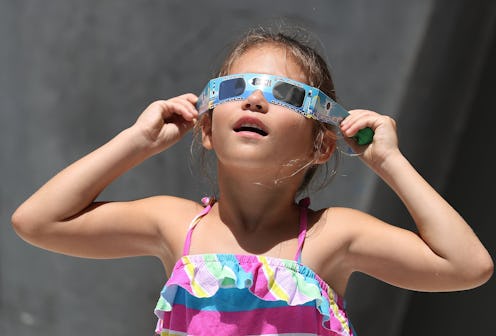Life
Looking At The Partial Solar Eclipse Can Cause Major Eye Damage — Here's How To Stay Safe

As a kid, I distinctly remember being constantly told not to look directly at the sun. Why this was constantly brought up, I can't tell you — but it is advice worth remembering as we approach Feb. 15, when the first partial solar eclipse of 2018 will occur. While looking at the sun is always bad, looking at the sun during a solar eclipse, total or partial, is way worse, and could potentially damage your eyes. So, if you're wondering if you need eclipse glasses during a partial solar eclipse, the answer is a hard yes. Literally, don't even think about looking at any eclipse without them.
So, how do eclipse glasses work? Eclipse glasses are made of a black polymer that protects your eyes from harmful rays. Black polymer is created when flexible resin is infused with carbon particles. So, yeah, it's really strong. Also, if you thought that you could use your sunglasses to protect against the eclipse, think again. According to Forbes, black polymer is 100,000 times darker than typical sunglasses. So, no, it doesn't matter how dark your shades are, the rays will still get through.
It's also important to note that if you have eclipse glasses left over from August, it's probably not safe to use them. If you look carefully most eclipse glasses have a warning on the side that their protectiveness fades after a few minutes of use. Of course, some retailers and sketchy online sites may sell eclipse glasses that aren't exactly up to par: The American Astronomical Society breaks down exactly what to look for to determine the safety of your eclipse glasses here.
If you're unsure, one of the best tests to see if your eclipse glasses are safe is to look directly through them now. If they're legit, then you shouldn't be able to see anything except when you are looking at an incredibly bright light. Knowing what realtors sell real eclipse glasses is so important to ensuring your safety as you view the eclipse. If you encounter faulty glasses, make others aware to ensure their safety.
Why You Can't Skip The Eclipse Glasses
If you've thought about skipping the eclipse glasses and looking directly at the sun like someone — cough Trump — did in August, please reconsider. Looking directly at the sun can cause you real and permanent eye damage. When looking at the sun, the first thing to hit is the visible light. However, it is soon followed by UVB rays which may burn your corneas' outer cells. The effects of which are both painful and cause blurry vision. Following the UVB rays are UVA rays that, if absorbed directly by your eyes, can damage your retina and your macula. It's even possible that this can cause macular degeneration or - at it's worst - permanent blindness. Think about how many more solar eclipses you'll miss if you go blind, definitely not worth it.
While you may feel fine immediately following a peak directly at the sun, the impact can take a day or so to set in. If you looked directly at the sun for a prior eclipse and think you're fine to do it again, think again. While minor, unnoticeable damage may have occurred last time, even if it didn't that's no guarantee that your eyes will manage this time around.
Please, please, please spend the money to get new eclipse glasses if you plan on looking at the partial solar eclipse. A few moments of glasses free eclipse viewing is not worth the myriad of potentially permanent issues your eyes can face from looking directly at the sun.